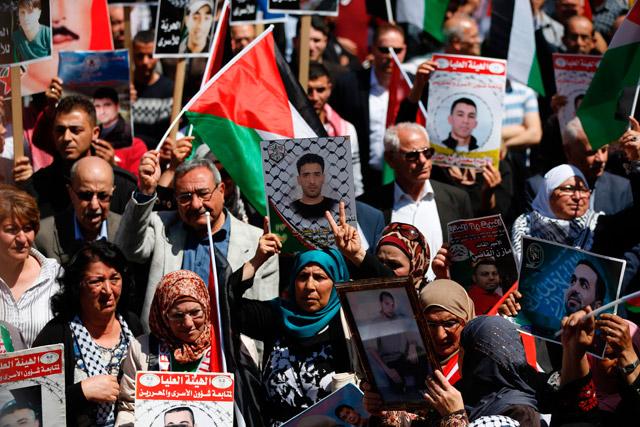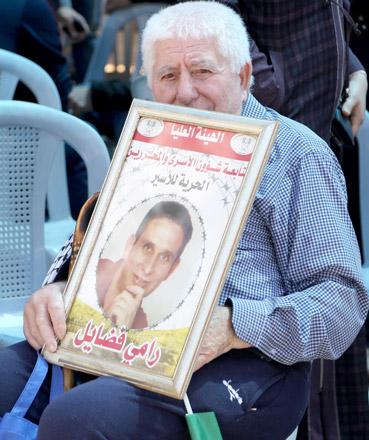You are here
Palestinians end mass hunger strike
By AFP - May 27,2017 - Last updated at May 27,2017

Palestinians take part in rally in support of Palestinian prisoners held in Israeli jails who ended their hunger strike earlier in the day in Gaza City on Saturday (AFP photo by Mahmoud Hams)
RAMALLAH, Palestinian Territories — Hundreds of Palestinian prisoners in Israeli jails on hunger strike since April 17 have ended their mass protest after Israel agreed a deal following weeks of refusing to negotiate, sources on both sides said on Saturday.
Some 30 of the more than 800 hunger strikers had been hospitalised in recent days, raising fears of an escalation of clashes with Israeli security forces in the occupied West Bank.
Palestinians hailed the deal as a victory for the hunger strikers after Israeli authorities repeatedly vowed not to negotiate with convicted "terrorists".
Palestinian Authority prisoners’ affair chief Issa Qaraqe said it had come after some 20 hours of talks between Israeli officials and strike leader Marwan Barghouthi, a figure revered among Palestinians but reviled by many Israelis.
An Israel Prisons Service spokeswoman confirmed the hunger strike was over but said the deal had been reached not with prisoners’ representatives but with the Palestinian Authority and the International Committee of the Red Cross (ICRC).
Israeli authorities conceded to one of the prisoners’ main demands — that they should have two family visits a month instead of the one they were entitled to before the strike, the spokeswoman said.
Palestinian Prisoners’ Club chief Qaddura Fares said there had been a last-minute U-turn by the Israeli authorities who had finally approached Barghouthi for talks.
“Right up to 8am on Friday, the Israel Prisons Service insisted that no negotiations were possible,” Fares told AFP.
“Then two hours later everything changed,” he said, adding that Israeli negotiators had began talks with Barghouthi.
“In his cell in Ashkelon prison, they held more than 20 hours of negotiations, Fares said.
“An agreement was finally reached with the prisons service.”
Qaraqe said full details of the deal would be announced later but news of it prompted celebrations in the West Bank city of Ramallah where supporters have staffed a solidarity tent throughout the hunger strike.
Barghouthis’s wife Fadwa hailed a “victory for resistance and dignity” after the end of the 41-day hunger strike.
Amal Abu Dalal, a 50-year-old mother whose 33-year-old son has been in jail for 14 years, said: “The prisoner has defeated the jailer. We’re so happy. We won.”
The ICRC had warned on Thursday that its doctors who have been visiting the prisoners were concerned about “potential irreversible health consequences”.
ICRC spokesman Jesus Serrano welcomed Saturday’s end of the strike and said it would do all it could to facilitate the additional visits.
The resolution of the strike coincided with the start of the Muslim dawn-to-dusk fasting month of Ramadan.
Palestinian President Mahmoud Abbas had urged US counterpart Donald Trump to raise the issue with Israeli Prime Minister Benjamin Netanyahu during his visit to the region earlier this week.
He raised the issue again with Trump envoy Jason Greenblatt in a meeting at his headquarters in Ramallah on Thursday.
Demonstrations in support of the prisoners had been held across the West Bank, leading to repeated bloody clashes with Israeli forces.
They come as the 50th anniversary nears of Israel’s seizure of the Gaza Strip and the West Bank, including East Jerusalem, in the Six-Day War.
The hunger strike was led by Barghouthi, a prominent figure in his Fateh movement and revered by many Palestinians, in contrast to the increasingly unpopular president.
Dubbed the “Palestinian Mandela” by supporters, Barghouthi is serving five life sentences on charges of involvement in murders committed during the second Palestinian Intifada, or uprising, that have made him a hate figure for many on the Israeli right.
Barghouthi had been moved to solitary confinement and received a single reported visit by the ICRC to check on his condition on May 11.
On May 7, Israel’s prison authority shared a video of what it said was Barghouthi eating biscuits in a break from the strike.
But his wife Fadwa dismissed the footage as a “fake... intended to break the morale of prisoners” and called on Pope Francis to intervene.
Palestinian analysts hailed the deal as a victory for the hunger strikers.
“It is very likely that the United States was directly involved in the discussions,” said one analyst, Hani Al Masri.
Abdel Majid Sweenem welcomed the fact that the Israeli authorities had been forced to negotiate with prisoner representatives after trying to avoid doing so at all costs.
“But we still have to see if Israel will respect its commitments,” he warned.
Related Articles
RAMALLAH — Hundreds of Palestinians in Israeli jails launched a hunger strike Monday following a call from leader and prominent prisoner Mar
OCCUPIED JERUSALEM — The Red Cross visited the leader of hundreds of Palestinian prisoners on hunger strike in Israeli jails on Thursday for
RAMALLAH, Palestinian Territories — Palestinian leaders on Wednesday denounced Israel's refusal to negotiate with Palestinians on hunger str













